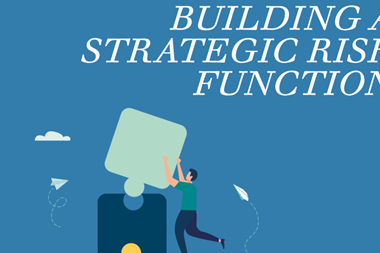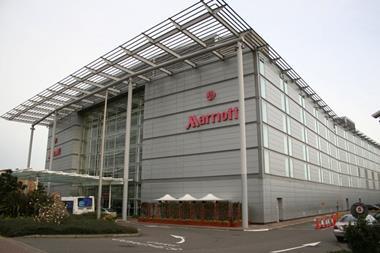It is a source of pleasure to him, as he says: "In risk management there is always something new to challenge you, something you haven't thought about before and you get to look at almost every aspect of the business."
Taylor did not set out in life to become a risk manager. Searching for a job after deciding he would rather work than go to university, he was offered a job at Sun Alliance. Part of the reason he took it was that he liked the man who interviewed him. It was also convenient for home. "It wasn't scientific decision making at its most precise," he says. Nevertheless, the atmosphere was congenial, with more experienced staff taking the time to share experience with new employees.
From Sun Alliance, Taylor diverted into music as guitar player for a rock band. Unfortunately, the band's business skills did not match its musical ability, so after a while it was back to insurance and the London market operation of the Prudential. "But we had fun and made lots of music," Taylor comments.
When the Pru decided to withdraw from the London market, Taylor ended up working for the private US construction company, Bechtel, on a joint $1.3bn gas injection project in Abu Dhabi with French and Lebanese teams. He had been there about a month when the department changed its name from insurance to risk management, "and I thought I'd better find out what that was." Thus, he discovered the Institute of Risk Management (IRM), where he took the diploma, and joined AIRMIC. Risk management at Bechtel was part of the legal department, and to this day Geoff is a careful reader of contracts and the way they distribute risk.
The next move was to jeans manufacturer Levi in 1996. The company was struggling with the decision to close factories. It would have been interesting, Taylor thinks now, to have risk managed the decision-making process over the issue. "They might have come to the decision more quickly using that approach." This comment underlines his theme for his year as chairman of AIRMIC: 'creating competitive advantage through risk management'. Risk management creates a more standardised, analytical approach to decision making, he says.
A quick run through
When he learned that Nike was looking for a risk manager for Europe, the Middle East and Africa, Taylor was initially reluctant to move, but the job offered the lure of a broader portfolio. He joined Nike in 2002 and has responsibility for security, environment, safety and health. He reports to the chief financial officer for the region. He is not primarily concerned with insurance, since the group has a global programme, but makes use of his experience to liaise with brokers and reinsurers. As he says, "I speak the language."
Taylor's division of Nike operates in 27 countries, so the security and crisis management part of his job is a significant one. Corporate social responsibility (CSR) is important to Nike, having been through the mill over the conditions for workers in its contractors' factories. Taylor believes that Nike is now one of the leading organisations in communicating its CSR. Part of his job is getting contractors to align their practices on issues like health and safety with those of Nike itself.
Chairman's role
During his year as AIRMIC chairman, Taylor wants to continue to work with the structure and strategy plan to ensure that the objectives for the year are completed. His theme for the year, suggests that emphasis is likely to shift back towards risk management, whereas insurance has recently tended to have a higher profile because of contract certainty and broker remuneration issues. He is also keen on AIRMIC's support for smaller businesses that do not have a professional risk manager or insurance buyer.
Taylor would like to see AIRMIC bringing together people who can talk about their experiences on the ground. "You know that something is going to happen, but you cannot say what it is and how it will begin. All we know is that we need to be prepared for any eventuality," he says.


















